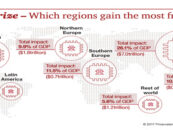
Navigating Technology’s Impact on Revolutionizing Storage Solutions
by Fintech News Singapore January 15, 2024As we continue to create and acquire more items in our lives, the need for efficient and effective storage solutions becomes more critical.
From simple shelving units to complex climate-controlled storage facilities, there’s an extensive array of options available to cater to our diverse needs. These storage options not only provide a means to organize and protect our possessions but also play a crucial role in managing space, improving accessibility, and enhancing the aesthetic appeal of our living and working environments. The following sections will explore various storage solutions, assessing their benefits and challenges, and how technology is revolutionizing this domain.

Image by sarla Wu from Pixabay
Smart Storage Systems
The advent of smart technologies has made a significant impact on physical storage solutions. Smart storage systems, equipped with IoT devices, provide real-time tracking, manage inventory, and even adjust environmental factors for optimal storage conditions. This level of automation not only ensures effective utilization of space but also mitigates the risk of damage to stored items.
Despite their benefits, smart storage systems have their drawbacks. They require a considerable investment upfront, and their reliance on constant connectivity can be a potential point of failure. Plus, they also necessitate ongoing maintenance and upgrades to remain effective and efficient. From robotics storage solutions to automated warehouses, technology continues to revolutionize the storage industry and is undoubtedly the way forward for efficient and seamless management. It’s only a matter of time before smart storage becomes the norm.
Sustainable Storage Solutions
In an era of environmental consciousness, sustainable storage solutions are gaining popularity. These solutions utilize eco-friendly materials and aim to reduce the carbon footprint through energy-efficient designs. Examples include solar-powered storage units and the use of biodegradable packing materials.
However, sustainable storage solutions may face challenges in terms of cost and availability. Eco-friendly materials can be more expensive than traditional options, and some sustainable solutions may not be readily available in all regions. Additionally, these solutions may not be suitable for storing certain types of items that require specific conditions.
Personalized Storage Options
The desire for personalized solutions has led to innovative storage designs that cater to individual needs and preferences. From custom-built closet organizers to tailored warehouse storage systems, these solutions are all about providing the best fit for the user’s needs.
While the level of customization provides a significant advantage in terms of usability and space optimization, it can also lead to increased costs. Furthermore, the time and effort needed to design and implement these personalized storage solutions can be considerable, which may not be feasible for all individuals or businesses.
The Advent of Digital Storage
The digital realm has dramatically transformed how we store and manage information. Digital storage solutions like cloud-based services, virtual servers, and encrypted drives have enabled us to store massive volumes of data with ease and accessibility. These solutions provide the benefits of instant retrieval, easy sharing, and high-level security, making them an integral part of businesses’ and individuals’ lives alike.
However, these digital solutions are not without their challenges. Data breaches, cyber threats, and the potential for technical glitches can pose significant risks. Plus, the vast amounts of data stored require sophisticated management systems to ensure data integrity and ease of retrieval.
In conclusion, technology has undoubtedly revolutionized the storage industry, providing diverse options and solutions to cater to our ever-growing needs. From smart systems and sustainable designs to personalized solutions and digital storage, we can expect this domain to continue evolving as technology advances further.
Featured image credit: edited from Unsplash





